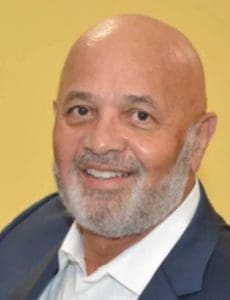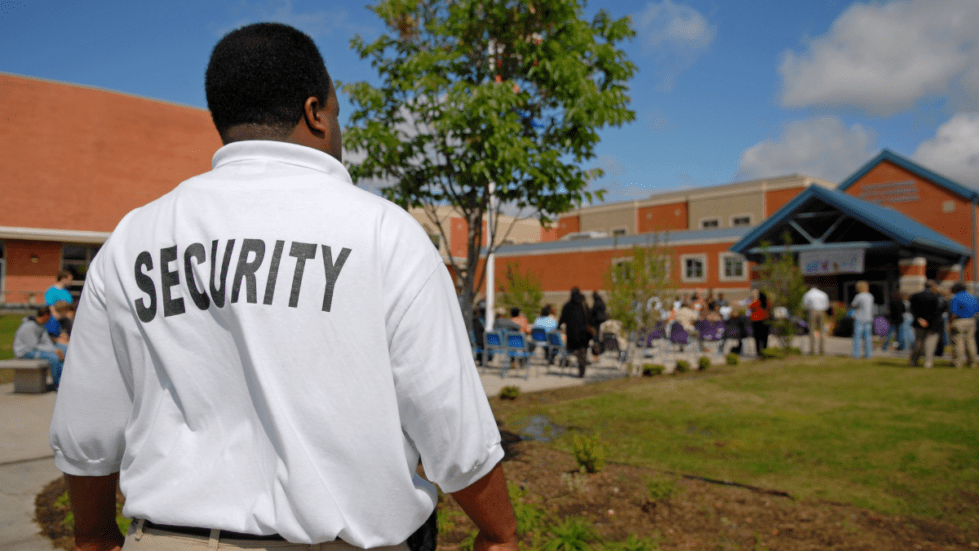
Over the last decade, many Delaware school districts have hired constables to help ensure school safety. (Getty Images)
Christina School District is the latest Delaware district to hire constables to help ensure student safety, a trend that has been spreading statewide.
Since the start of the school year, Christina has hired three at the elementary level.
School board member Don Patton expects Superintendent Dan Shelton to push for constables at secondary schools next.
“I’m against that and I’m gonna fight vigorously against that,” Patton said.
He believes the system should have constables in elementary schools, but that high schools only need a single school resource office.
What’s a school constable?
School constables are officers whose authority falls somewhere between a security guard and a police officer. They are armed with guns and handcuffs, but can’t make official arrests.
The sole difference between constables and school resource officers, Patton said, is that resource officers can make arrests.

Gary Zoll
Constables, however, can detain students or others on school property for up to two hours. After that, a student must be released or transferred to an officer who can make an arrest or press charges.
A district chooses the duties a constable will have, but they typically monitor cameras, patrol buildings inside and out, check doors, interact with students and train teachers on school safety initiatives.
“They are an integral part of our school safety plan in that they help monitor our buildings and make sure things are safe inside and out,” said Gary Zoll, director of student services at Seaford School District, which hired two constables in October.
Constables first were brought into schools in 2013, when Red Clay Consolidated School District hired four, including Brian Moore, who now is the program manager for school climate and discipline at the Department of Education.
That would mean they were hired around the time of the Dec. 14, 2012 shooting at Sandy Hook, which took the lives of 20 schoolchildren and six teachers.
Why are districts hiring constables?
“For us at Red Clay, it was really about relationship building,” Moore said. “Districts are happy having the extra added layer of security against external threats or active shooter threats and things of that nature.”
Other districts who have constables are Indian River; Capital School District; Appoquinimink; Milford; Woodbridge; and Laurel.
RELATED: Seaford hires 2 constables to ensure school safety
Zoll said recent school shootings definitely had an impact on so many districts hiring constables this year, including the May 24 shooting in Uvalde, Texas that killed 19 students and two teachers.
“It’s an added resource for us to help hopefully not have to experience an incident like Uvalde,” Zoll said. “We feel like constables are our best option to bring vast knowledge to us in policies and procedures to keep our staff and students safe every day.”

Brian Moore
Constables often are retired state troopers or law enforcement officers and typically paid a starting salary of $40,000, Zoll said.
According to Delaware code, if a constable applicant has no prior law enforcement experience, they must meet the minimum training standards set by the Board of Examiners of Constables.
They also must take a psychological assessment performed by a state-licensed psychologist.
With law enforcement experience, there’s still training, but it’s less rigorous, according to Paul Anthony, one of the constables hired by Seaford.
His training took eight hours, and he had to pass tests created by Wilmington University, he said.
The Board of Examiners of Constables, overseen by the Delaware State Police, reviews every application, stipulates the training requirements, stipulates the firearms requirements, and more.
Moore said constables originally were hired so the district would have employees dedicated to creating a safe environment.
The number of constables has grown, he said, because districts are attracted to the fact that they’re less expensive than school resource officers. and districts can dictate exactly what a constable does in their daily duties.

Donald Patton
“They’re evaluated, so districts are able to train them so that their interactions are within the context of what the district wants,” he said. “The interesting thing is you can see each district’s constables reflecting the culture of that district.”
Moore, Patton and Zoll agreed that it’s somewhat challenging to set metrics to gauge a constable’s success.
It’s hard to measure how many incidents were avoided because of a constable’s presence, Moore said.
For example, while the number of incidents might not decrease, violent or physical interactions usually do.
“Administrators often say that it’s nice to be able to have that extra person that could talk to a kid and help out before they get into trouble,” he said.
However, Patton said he’s generally opposed to having officers in schools as it “sends the wrong message.”
If constables are hired, they should largely be focusing on relationship building and training other staff members on how to handle altercations, he said.
He’s not a fan of paying them full-time salaries and would rather that money be spent on improving the mental health of students and staff to create a more uplifting school climate.
“Maybe we hire mental health people with that money, maybe we hire more psychologists with that money, maybe we train our staff around restorative practices or around social emotional learning,” Patton said. “Maybe we do those kinds of things with that money, so that we have much less need for more constables.”

Raised in Doylestown, Pennsylvania, Jarek earned a B.A. in journalism and a B.A. in political science from Temple University in 2021. After running CNN’s Michael Smerconish’s YouTube channel, Jarek became a reporter for the Bucks County Herald before joining Delaware LIVE News.
Jarek can be reached by email at [email protected] or by phone at (215) 450-9982. Follow him on Twitter @jarekrutz and on LinkedIn
Share this Post









